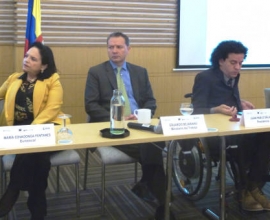Colombia towards the occupational inclusion of persons with disabilities
Public comment meetings were held in Cali, Medellín, Bucaramanga and Cartagena with the participation of business owners, trades, labour organisations, universities, and representatives of government bodies, among others
The Ministry of Labour, through the Directorate for Fundamental Rights and with the support of EUROsociAL, a programme of the European Commission for cooperation between Europe and Latin America, and the Presidency of the Republic, organized a public comment period for the draft decree regulating labour guarantees, rights, benefits and obligations for persons with disabilities, which today exceed 2.6 million inhabitants.
In the first public comment meeting held in Bogotá, Eduardo Bejarano Hernández, Director of Fundamental Rights, explained that the decree is expected to become a reality next July. "We are determined to bring about a change of attitude in the State and in society that makes it possible to break down barriers facing Colombians with disabilities in terms of access to the labour market".
The objective of the decree is to ensure effective exercise of rights and occupational inclusion; and to provide an authorisation procedure for termination of a work contract, compensation, job stability, recognition of pension, rehabilitation and activities related to prevention and promotion handled by the Occupational Risk Administrators (ARL) contained in Law 1618 of 2013 and 361 of 1997.
In the words of Juan Pablo Salazar, delegate of the Presidency of the Republic, "17 years after passing Law 361 of 1997, we want to facilitate change and adjustment of the regulation to generate confidence in public and private enterprises so that they hire persons with disabilities without the fear of later facing lawsuits".
The regulation will apply to persons with disabilities, employees and freelance workers, pensioners, solidarity economy organisations, the cooperative sector, non-uniformed staff of the National Police and military forces; Occupational Risk Administrators, and to insurance companies, disability certification boards, public and private employers, contractors and subcontractors.
The draft decree also seeks to regulate benefits when hiring or continuing the employment of workers with disabilities, such as access to low-interest lines of credit, equal conditions, an income tax deduction of 200%, reduction of 50% of social contributions for apprentices. All of these exist to favour hiring of persons with disabilities, employment in the public sector, protection of disabled workers, comprehensive rehabilitation, and definition of grounds for dismissal, among others.
On the other hand, María Covadonga, a consultant to the EUROsociAL Programme in Colombia, indicated that: "Everyone, regardless of their individual characteristics, must have open access to a job, and be able to hold it and be promoted. This is a right that cannot be seen as a threat to business in the country".
This awareness-raising process will be expanded to Cali (12th May), Medellín (21st May), Bucaramanga (26th May) and Cartagena (28th May). In these meetings, trades, labour organisations, universities and representatives of government bodies will participate.
Today's meeting included companies such as Avianca, Drummond, General Motors, Cerrejón, Teletón, Camacol, Asocolflores, Fasecolda, Occupational Risk Administrators (ARL), Colombia's National Federation for the Deaf (Fenascol); the Ministries of Commerce, Health and Interior; the Fondo Nacional del Ahorro [National Savings Fund); labour leaders; representatives of civil society and academia.
Ministerio de Trabajo de Colombia

